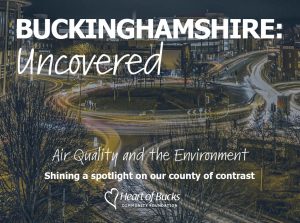
GUEST BLOG
Daniel Cope: Ambassador for Environment
There is an immediate and growing demand for an environmentally aware workforce within the country. Whilst 700,000 roles will be created within this sector in England by 2030, there will be further need for all employees to provide an environmental contribution in their role, on a longer term basis. We all will be impacted by environmental change, so it’s vital we are all part of the solution.
The Problems
General environmental ignorance is still surprisingly large, relative to media coverage over the past five years. Blame cannot be placed on one individual, sector, or institution, but rather on a collective failure to acknowledge environmental issues until the very last moment. Even now, many drag their feet.
If the problem exists at all levels of society, then surely it must be taught at the earliest of opportunities. Teachers, in many instances, do not have the tools to confidently guide this narrative. Whilst there is mention within the curriculum, it is minimal, buried within science and geography, not associated to the social issues it impacts. Plainly, it does not provide students with a practical understanding of the topic, how it impacts them and their futures, and how they can follow pragmatic environmental discipline in their lives and future work.
It is true that the lack of knowledge is not limited to educators. Business leaders are equally in need of genuine guidance on how to address this skill gap. The 2023 Buckinghamshire Local Skills Improvement Plan, undertaken by Buckinghamshire Business First, spoke of employers consistently reporting higher education leavers being poorly prepared for the workplace. Conventionally, there is a general expectation that graduates (in this case, environmental) entering the workforce will require further development. But how can this be done effectively if the hiring company does not fully grasp what they require for ‘the environment’, or don’t have this existing skillset within their workforce to transfer? This is the key barrier of many small-medium sized businesses wishing to employ an environmentally based employee, who may well be the first to hold such position within the business.
Further, we know the links between a person’s education and their social background – which in turn includes the environment. Buckinghamshire has an inequality gap, consistently widening each year, and therefore disproportionately limiting the opportunities of less well-funded schools. Where environmental activities are taking place it is extra-curricular, and so demands additional funding and resource.
I have been able to work with many businesses within Buckinghamshire on their environmental journey. Whilst often inspiring, it has highlighted to me that a knowledge gap continues to need plugging – although there do exist a few, rapidly growing eco-champions out there. To state again, this can’t be blamed on any individual, but does nothing in the way of transitioning us as a collective towards net zero.
Younger generations will tackle the problems of tomorrow, but it is the current workforce who need to tackle the environmental problems of today. However, the biggest knowledge gap of all exists in the current workforce. This is why so many young people are often inspired by their peers like Sweden’s Greta Thunberg and India’s Licypriya Kangujam, with less relatable role models in the wider mainstream.
The Solutions
The New Year is great time to recognise what we are getting right and lay out our objectives for 2024.
Firstly, there is brilliant work carried out by Buckinghamshire Skills Hub and Buckinghamshire Council, through the Green Schools Challenge, which enabled Year 12 students to collaborate with environmental experts, helping them to develop a range of green skills, and provide a solution for their schools’ environmental challenges. Last month, students pitched their concepts in a ‘Dragon’s Den’ style format to myself and colleagues, with Sir Henry Floyd Grammar School’s Swapify winning the day, displaying their novel school uniform return scheme proposal.
These approaches are great, and allow for environmentally minded students to be engaged; but what about the masses who are yet to be inspired? I was able to attend the Mandeville School last month to speak with Year 8 students about why the environmental sector is a strong contender for a future career. It’s imperative to raise awareness of different roles within the environmental field and to help students gain employability skills.
The Buckinghamshire Skills Show is another great opportunity for students and adults alike to explore new career opportunities. The annual festival sees over 120 attending businesses highlight a wide variety of careers from all sectors, including the environment. The 5,000+ visitors who attend will tell you what a valuable event it is. The Skills Show is also open to adults looking to explore new career opportunities on Wednesday, 6th March 2024 – get booked on!
In many instances, schools have enthusiastic staff who want to launch projects on site, but do not have the funding accessible to facilitate this. The Green Schools Fund, provided by our own Heart of Bucks supported more than 23 schools from 2020 to 2022. The funding supported a host of student-led ideas; creation of wild areas, recycling schemes, knowledge building initiatives, and my personal favourite; a wormery at Friends of Turnfurlong Junior School! The sky really was the limit (or the soil if you’re a worm!). Rumours are the Fund may be relaunched later this year, and it would be more welcomed than ever.
Whilst The Green Schools Fund inspires, it’s important again, to recognise that behind all of these superb projects, is the added pressure on teaching faculty to facilitate them. Goodwill seems to sit closely with so many environmental themes, but this should never negate the need, or function as a replacement for, the institutional change we are needing to see.
With technology, it should be easier than ever to provide environmental-knowledge opportunities for young people and adults, with barriers such as location being broken down. Fundamentally, the subject must have a larger footprint within the curriculum, to help us all drive down our carbon footprint. With this we can hope and expect the cultural change within the future workplace that will protect the environment for the future workforce and for society at large.

Read more about the environmental challenges being faced in Buckinghamshire in
our latest Buckinghamshire Uncovered Report – Air Quality and Environment.


